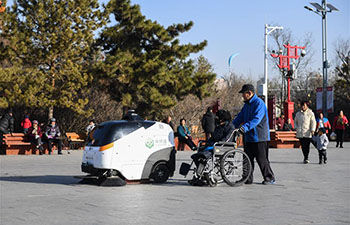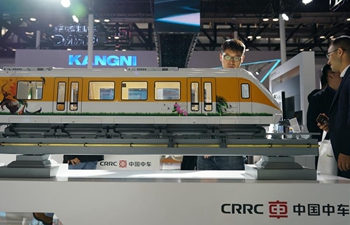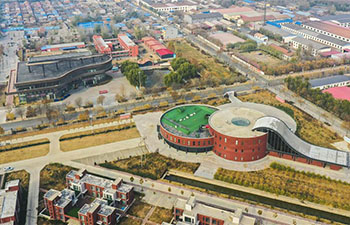
Charles A. Laughlin, chair of the Department of East Asian Languages, Literatures and Cultures at the University of Virginia, speaks in an interview with Xinhua at his office in Virginia, the United States, on Sept. 12, 2019. For Charles A. Laughlin, it has already been his "congenial career" to study and translate contemporary and present-age Chinese literature. (Xinhua/Zhou Sa'ang)
By Xinhua writers Yang Shilong, Ding Yimin
NEW YORK, Nov. 23 (Xinhua) -- When he was a boy in the 1970s, Charles A. Laughlin would sometimes follow his mother, an adventurous cook in the home kitchen, to an Asian market to find ingredients for making Chinese dishes in his hometown Minneapolis, U.S. state of Minnesota.
"Immediately after you walk in, the strong smell of dried fish or other kinds of pungent spices hit you right away. And it creates a sense of fascination," said Laughlin, professor of Chinese literature and chair of the Department of East Asian Languages, Literatures and Cultures at the University of Virginia.
Those visits to the Asian supermarket and Chinese restaurants had led to Laughlin's decision to study Chinese in his second year at the University of Minnesota. Now, for the 55-year-old professor, it has already been his "congenial career" to study and translate contemporary and present-age Chinese literature.
EMERGENCE OF CHINESE LITERATURE
Contemporary Chinese literature started to take on a greater brilliance when the ancient Asian country launched its reform and opening up in the late 1970s, Laughlin said.
When Laughlin started teaching at Yale University more than 20 years ago after he graduated with a PhD in Chinese Literature from Columbia University, it was not difficult to decide what to teach.
"You have a fairly short list of the really important authors and some really significant works to use," said Laughlin. The names included Lu Xun, Mao Dun, Cao Yu, and Ba Jin, mostly authors from the first half of the 20th Century.
More and more Chinese writers and critics have since entered the international arena, he said. In October 2012, novelist Mo Yan was awarded the Nobel Prize in Literature for his work that "with hallucinatory realism merges folk tales, history and the contemporary."
"It's hard for me to keep up with all of the great (Chinese) authors who are being brought into English," he said. "So I've been responding to that by teaching less and less of the early major authors from 100 years ago."
What also caught Laughlin's attention is the emergence of Chinese science fiction, particularly Liu Cixin's Hugo Award-winning Three-Body Problem, in recent years.
"They are becoming not only popular among Chinese readers, but also across the world," he said. "There seems to be a lot more excitement and attention to them than any other movement or group of Chinese writers who has emerged since the 1980s. So I adopt more and more of this."
The scholar noted that modern Chinese culture "kind of originated with the adoption and translation of Western science fiction into Chinese" and Lu Xun, Lin Shu and many other important Chinese authors of the early 20th century had translated Western science fiction.
"Now Chinese science fiction is becoming globally influential. I think it's a great phenomenon," he said. "So there's a kind of full circle here."
FLAVOR OF TODAY'S CHINA
When he and professor Liu Hongtao from Beijing Normal University were selecting the novellas for their 2016 book "By the River: Seven Contemporary Chinese Novellas," Laughlin said they were looking for works of today's China that conveyed the fabric of contemporary experience in the thriving economy.
"We wanted to show the flavor of everyday life in China, without so much drama and violence," said Laughlin. What American readers often look for when they read Chinese authors, however, is "some kind of criticism of some kind of problem" in society, he added.
Laughlin was confident that their selected Chinese Literature would help Western readers better understand the more complex and richer reality of the fast-transforming Asian power.
"What literature does, and this goes for independent documentary films and contemporary feature films as well, is to recreate the subjective experience of being Chinese," he said.
Literature is the original "virtual reality," be it poetry, fiction, drama or essays, which not only "portrays" what is going on in China today, but "delivers the feeling of experiencing it, often in emotionally intense settings such as love or trauma," said Laughlin.
"When it is very good, it may also rise above the moment and say something more profound about China, the world, or humanity which is something we also don't expect from media coverage," he said.
"One doesn't need to limit one's reading to contemporary writers," he said. "The more you read back into the century before and the centuries before that...the more you see the continuities and changes of Chinese culture."
CROSSING CULTURAL BARRIERS IN DIGITAL, VISUAL WORLD
Laughlin has been changing his syllabus and ways of teaching his students about literature in general as it is becoming "marginalized by digital culture and visual culture." His Chinese literature course is no exception.
"I think another challenge we have here is that students are not necessarily reading a lot of literature anyway, " he said. "We have to draw their attention back to the specific richness of language and text. But I also use more film and visual culture in my classes."
As to his students' reaction to the "By the River" novella collection, he said: "American students who don't know so much about China find it a little difficult to relate to the problems and issues that characters in these stories are dealing with."
"Some of them liked stories more than I expected them to. And some of them disliked stories that I thought that they would like," he said. "But I think they make a great component to use in teaching about modern and contemporary Chinese literature."
"Apart from learning the thoughts, feelings, and priorities of Chinese characters or authors, I think literature helps convince us of our common humanity," he said. "This is particularly important in a world that uses language and media increasingly to divide us and distance us from others."
"People who don't read foreign literatures are more likely to view people of other cultures as fundamentally different and incomprehensible. Literature reminds us that behind walls of politics and ideology there continue to be ordinary people, flirting with each other, dealing with the deaths of their parents, stealing bicycles, catching a cold, competing for recognition, or worrying that they look too old when they see themselves in the mirror," he said.
"We can relate to these things, and the power of this ability to relate is multiplied when it crosses linguistic and cultural barriers. When you can see this commonality, you are less likely to dehumanize someone from another culture with stereotypes and prejudice, and this could help diminish a lot of hatred and violence," he said.
In today's highly visual, digital culture, the challenge is "how to get literature in front of people," Laughlin said.
"We are all still reading. Our relationship with paper is changing...the amount of reading happening on screens is surprisingly voluminous, including my own," he said. "So it's about us helping it proliferate through social media, with hashtags and through opinion influencers."
Science fiction from China, which is highly literary, has a lot of momentum in digital culture, especially now that it is coming out in movie form such as The Wandering Earth, he noted.
He said Liu Cixin's fictional worlds, such as the one in the Three Body Problem, point to the past history and culture, and invite readers to explore further.
Similarly, gamers may encounter The Three Kingdoms, a 14th-century historical novel considered as one of the Four Great Classical Novels of Chinese literature, in the form of a game, and it and other novels in the form of fan fiction, he said.
"I don't know how much fan fiction can lead readers back to great original literary works, but we can explore the possibilities," he said. "The motivation or rationale to do so is to engage with the feelings of a Chinese historical subjectivity, and through it learn what matters to people in Chinese society rather than simply have it explained."











